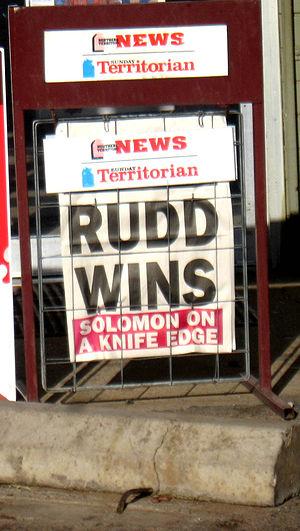
Australia is now enduring full election fever as the nation counts down the days until the ballots are held on 7th September. Both state and federal parliaments are being fought over, though it’s clear this election centres on the battle between the (newly reinstated) Labor leader Kevin Rudd and the Liberal-National Coalition leader Tony Abbot.
Rudd, having definitively reclaimed the leadership role from the highly able but unpopular Julia Gillard, is attempting to lead Labor to a third term in office. He is also seeking to avoid the trap which weakened Labor’s hand over the past term: the lack of a parliamentary majority. The hung parliament of 2010-13 forced the Labor government to rely on a small number of Independent and Green MPs to prop it up, forcing it to implement the hugely controversial Carbon Tax in return. At present, Rudd is using his personal popularity and Labor’s record on the economy to boost Labor’s standing in the polls.
Tony Abbot, by contrast, enjoys a slender poll lead but relative personal unpopularity. His deep social conservatism has offended many younger voters, who disagree with his opposition to same-sex marriage, legalisation of euthanasia, and his harsh approach to asylum seekers. Nevertheless, it seems that such right-wing populism has won a number of votes, and seems to have prompted Labor to compete with the Coalition to establish the most draconian policy on asylum seekers.
Indonesians and Sri Lankans, aiming to flee brutal regimes, have been traveling to Australia by boat for many years. Labor has previously opened offshore processing centres on Nauru and in Papua New Guinea, whilst also working with Indonesia to tackle people-smuggling issues. This has done little to discourage the wave of boats landing on Australia’s shores, prompting Rudd to propose a new policy whereby refugees will be redirected for permanent settlement in Papua New Guinea. This would be more justifiable if Papua New Guinea were not a developing nation itself, where such refugees can expect to join the one-third of the population living on less than 90p (AUS$2) a day. However, if Labor’s policy seems extreme then the Coalition’s is even worse: turning, and if required, towing, boats back to the countries of origin. This is without making any attempt to establish if any asylum seeker has a good case.
Nevertheless, the only major party proposing a fair policy on refugees, the Green Party, is polling a mere 8-10%, which suggests that there is little sympathy amongst the Australian electorate for this group. Or perhaps their attention is more keenly focussed on the two biggest, and thoroughly intertwined, issues: the economy and the budget deficit. To the European observer, it would seem to be a great success story: the economy is growing steadily after a relatively shallow recession, households are saving more and unemployment is low. The budget deficit is moderate, will be eliminated within three years and the national debt is comparatively low- the country retains its AAA credit rating. A sound example, you might say, of how Keynesian economics really does work when executed properly.
Strangely, few voters appear to credit Labor for leading it through a global financial crisis relatively unscathed. Abbot’s line that growth is being fueled by ‘unsustainable’ deficit spending resonates with much of the electorate, who endorse his plan of massive spending reductions despite the clear evidence that this has scuppered recoveries in countries like the UK. European observers see a nation poised to repeat the mistakes that we have made.
But is it ‘poised’ to do so? The Liberal-National Coalition has such a tiny lead over Labor that a surprise recovery by the Government is perfectly possible. Indeed, a Government which has delivered growth and has a more popular leader is likely to benefit from ‘silent support’- those who will quietly vote for them but won’t talk to pollsters. Such a phenomenon has been observed most clearly in the UK in 1992; France in 2007 and the US in 1996.
The next few weeks will be very interesting indeed.

